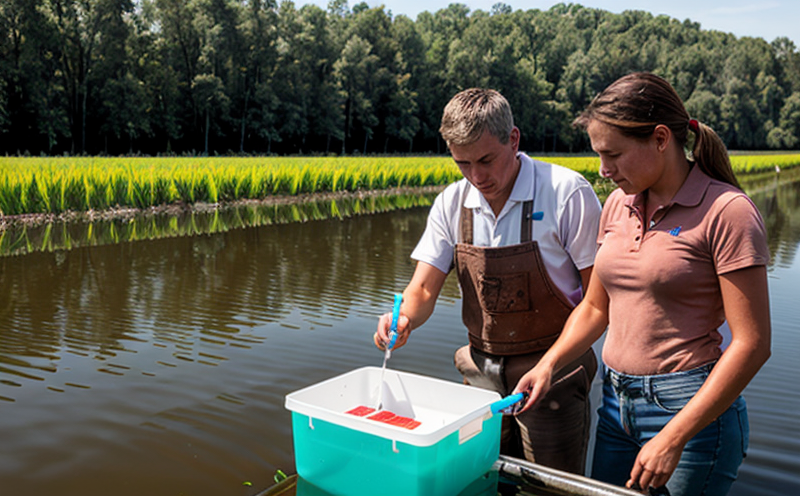Nitrate-Nitrogen Testing in Irrigation Water
Introduction: Nitrate-nitrogen (NO₃⁻) testing is a critical aspect of water quality analysis, particularly relevant for agricultural and forestry sectors. The presence of nitrate-nitrogen in irrigation water can have significant implications on crop health, soil fertility, and environmental sustainability. Excessive levels of nitrates can lead to contamination of groundwaters and pose risks to human health through drinking water supplies.
In the context of agriculture, proper management of nitrogen content is essential for optimizing crop yields while minimizing the risk of runoff into surrounding ecosystems. This service focuses on providing accurate and reliable nitrate-nitrogen testing in irrigation water, ensuring that agricultural practices are both sustainable and compliant with international standards such as ISO 14025.
The process begins with the collection of representative samples from various sources within an irrigation system. These samples must be handled carefully to prevent contamination, which can lead to inaccurate test results. After collection, the samples undergo rigorous preparation steps including filtration and dilution, if necessary, before analysis by advanced instrumentation such as continuous-flow analyzers (CFA).
The analytical method employed typically adheres to internationally recognized protocols like ISO 7405 or ASTM D1253. These methods ensure precision and consistency in determining nitrate-nitrogen concentrations down to parts per million (ppm) levels, which are crucial for decision-making processes related to irrigation scheduling.
From a technical standpoint, the testing involves monitoring both total nitrogen content as well as dissolved organic carbon (DOC), alongside pH values. These parameters provide comprehensive insights into the overall quality of the water being used for irrigation purposes. Understanding these factors helps farmers and agriculturalists make informed choices about their practices, leading to improved efficiency in resource utilization and reduced environmental impact.
The importance of this service cannot be overstated given its role in supporting sustainable agriculture initiatives worldwide. By ensuring that nitrate-nitrogen levels remain within acceptable limits, we contribute towards preserving natural resources while enhancing productivity through scientifically sound agricultural practices.
Eurolab Advantages
Eurolab offers unparalleled expertise in the field of nitrate-nitrogen testing for irrigation water. Our team comprises highly qualified professionals with extensive experience in environmental sciences and agricultural technology.
- Accurate Results: Utilizing state-of-the-art equipment and adhering strictly to established international standards guarantees precise measurements and reliable data.
- Comprehensive Services: Beyond just testing, Eurolab provides consultancy services aimed at helping clients optimize their irrigation systems based on the results obtained from our analyses.
- Client Support: Our dedicated customer service team ensures prompt response and tailored advice to meet individual client needs.
Competitive Advantage and Market Impact
Eurolab’s commitment to excellence in nitrate-nitrogen testing sets us apart from competitors. Our services are recognized for their accuracy, reliability, and efficiency, making them indispensable tools for quality managers, compliance officers, R&D engineers, and procurement personnel involved in agricultural projects.
Our ability to deliver consistent results across different environments allows our clients to confidently implement best practices that enhance operational performance and sustainability. This not only benefits individual farms but also contributes positively to broader environmental goals such as reducing nitrogen leaching into groundwater sources.
Use Cases and Application Examples
- Irrigation Management: Monitoring nitrate-nitrogen levels helps in adjusting irrigation schedules, thereby conserving water resources without compromising crop quality.
- Air Quality Control: By minimizing nitrogen losses through runoff or vaporization, this testing aids in maintaining cleaner air around agricultural operations.
- Ecosystem Protection: Reducing nitrate-nitrogen pollution prevents harm to aquatic life downstream from farm fields.





